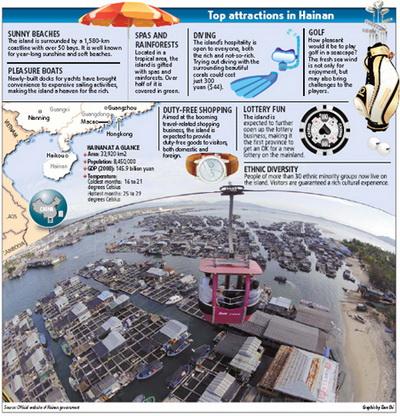Gov't loosens regulations to spur island province's development.
Lottery regulations are being relaxed in China's tropical southern island province of Hainan to assist it becoming a global resort within a decade, marking a big step forward for the country's lottery business.
The State Council, China's Cabinet, gave permission to Hainan on Monday to "explore and develop" pari-mutuel sports lotteries and instant sports lotteries on large international events, which is expected to enrich Hainan's tourism resources.

It aroused media speculation that horseracing is likely to be introduced to the island, or that Hainan would even become China's answer to Las Vegas.
Hainan has been given more space than other parts of China to explore the lottery market, but it does not mean Hainan will break China's laws," Hainan Governor Luo Baoming told a press conference yesterday.
He declined to confirm whether pari-mutuel horseracing would be introduced to the island.
Gambling is illegal on the Chinese mainland, according to Chinese laws.
Welfare and sports lotteries were permitted two decades ago to raise funds for welfare and sports causes, and a regulation was passed last year to legalize the lottery business in China, said Wang Xuehong, director of the China Center for Lottery Studies based in Peking University.
Previously, pari-mutuel sports lotteries could only bet on the results of foreign basketball and football games, not domestic games, out of fear of match fixing and other unfair practices, she said.
"Now the rules allow pari-mutuel sports lotteries to bet on the results of domestic and international sports events that are held in Hainan, which will be a big step forward for China's 22-year-old lottery business," she said.
Biking, sailing, beach volleyball and horseracing, as long as they are held in Hainan, could all be the subject of the pari-mutuel lottery in the future, she said.
The lotteries, as well as duty-free shopping, a broadened visa-free policy and a harsher crackdown on illegal tourism practices to improve Hainan's image, are expected to work together to attract more tourists from home and abroad.
Hainan is expected to become a global tropical island resort destination by 2020, and the tourism industry is expected to contribute 12 percent of GDP in Hainan by then.
To support the island's development, the State Council has given the nod to Hainan to explore the possibility of allowing domestic tourists outside of Hainan to do duty-free shopping on the island.
The Ministry of Finance is leading a feasibility study on the practice as well as giving tax refunds to overseas tourists in Hainan.
The news, however, worried some who fear Hainan might shake Hong Kong's position as the shopping paradise.
To reject the concern, Hainan Party chief Wei Liucheng said Hainan is only in the experimental stage, and it will take a period of time for Hainan to build and develop a shopping environment matching the level of Hong Kong.
"In the period we can foresee, a strong competition between Hainan and Hong Kong is not going to take shape," he said.
Hainan will also attract tourists by further extending its favorable visa-free policy to five other nations - Finland, Denmark, Norway, the Ukraine and Kazakhstan - from the previous 21 nations including the United States, Japan and Canada.
The requirement on tour groups from Russia, the Republic of Korea and Germany will also be loosened to require a minimum of two people, and they can stay for a maximum of 21 days in Hainan.
"Sanya in Hainan province is already in the top few cities in China in terms of tourism facilities and service quality," said Tang Yibo, supervisor of the holiday department of ctrip.com, China's leading online travel service.
"Now with the central government's policy support, I believe Hainan will elevate itself in many aspects, such as infrastructure and service, to an international level. It will benefit tourists more," he said.
Hainan received some 750,000 overseas tourists in 2007, mostly from Russia and South Korea. In total, it received 18.4 million tourists from home and abroad in 2007.
Related News
Photos
More>>trade
market
finance
- Wei Liucheng meets with WTTC president Jean-Claude Baumgarten
- "Miss Best Figures " came out in Sanya Miss Bikini International World
- Wei Liucheng ends his three-nation visit to Latin America
- The 35th Miss Bikini Int'l World Final kicks off in Sanya
- Crescent moon below planet Venus observed in S China





